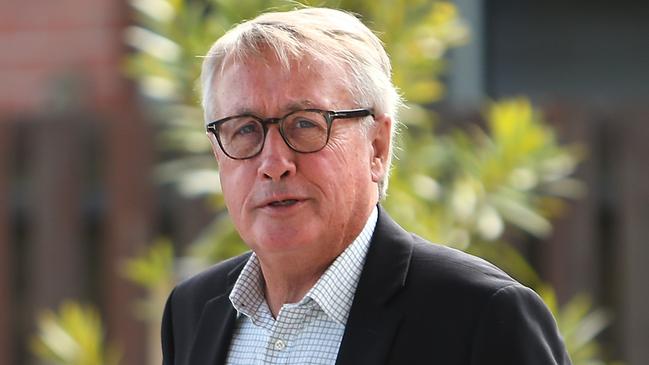Stick to ‘tax and spend’ plan, Wayne Swan tells ALP
Wayne Swan backs election-losing tax-and-spend agenda, saying Shorten lost voters because the party was too vocal on progressive issues.

Labor’s national president, Wayne Swan, has warned the party against dropping the tax-and-spend agenda it took to the May election, declaring that Bill Shorten lost working-class and regional voters because the party was too vocal on progressive social issues.
The former Labor treasurer, who travelled with Mr Shorten during the campaign, has warned Anthony Albanese against making wholesale changes to his predecessor’s tax and climate policies, saying it was an “agenda to be proud of, not resile from”.
Mr Swan backed Mr Shorten’s plan to close “tax loopholes” — such as the negative gearing and franking credit crackdowns — so spending on health, education and childcare could be bolstered.
“A victory built on winning a race to the bottom on cheap tax cuts or consolidating power in the hands of a few is not a victory at all,” Mr Swan said on Friday night in a speech launching a book on Labor history by academic Adrian Pabst. “Sometimes you’ve got to take one for history and maybe, in a sense, we did that in May.”
At the end of a week in which the Opposition Leader kept his party’s focus on a Tamil family facing deportation because they were not refugees, Mr Swan said Mr Shorten’s economic messages were drowned out by “worthy debate on other issues”, including the controversy over Wallabies player Israel Folau’s sacking by Rugby Australia.
The Queensland party heavyweight, who is a mentor to Treasury spokesman Jim Chalmers, said Labor made the critical mistake during the campaign of failing to centre its messaging on jobs and growth, which made working-class people think their economic concerns “don’t count”.
“If you’re a truck driver in Logan City or a steelworker in Wollongong, you are constantly told to work harder for less while tax cuts go to the top end,” Mr Swan said. “All the while, progressive issues, such as the Folau case, jump the queue of daily concerns and workers think their priority issues of jobs and wages are not on the agenda.
“When your primary concern is the economic insecurity of your family, hearing constant debate and conflict over social issues makes you feel like you don’t count.
“Our party has a proud record of progressive social reform, but we must always have at the forefront of the economic battle the interests of working people. And that means jobs, jobs and jobs.”
Mr Swan endorsed a speech last month by Labor senator Kim Carr, who said the party’s base was suspicious of the language used by party activists.
“To many people in our working-class base, our activists seem to talk the language of the inner cities, of the affluent middle class,” Senator Carr said. “They see Labor and its activists as part of a class that has benefited from three decades of neoliberal economic policy and globalisation.
“What is really frightening is that the Labor Party has lost the capacity to communicate effectively with people who feel this way.”
Dr Pabst’s book, The Story of Our Country, was endorsed by Dr Chalmers, who said it would “help us consider and counter the challenges ahead”.
Former finance minister Lindsay Tanner said the book was about “purpose and soul”.
“It is particularly worthwhile that Pabst uses the lens of religious belief for the broad purpose of questioning the state of modern Labor’s belief system, not to pursue a narrow religious agenda,” Mr Tanner said.
In the campaign, Mr Shorten sought to deflect the spotlight from his policies by lashing Scott Morrison for refusing to say whether he thought gay people would go to hell. Mr Morrison was forced to clarify his position after the attack, saying he did not believe gay people would go to hell.
Some Labor MPs believed the incident was seen as an attack on the Prime Minister’s religion, however, and thought it lost the party ground in western Sydney.
Labor also campaigned on easier access to abortions, a first-term referendum on indigenous constitutional recognition, a plebiscite on a republic and targets to get more women in senior positions in business and the public service.
Mr Swan said Labor should have done more to defend against the attacks on its economic and climate policies. “Conservatives offered a massive tax cut for high-income earners while Labor proposed modest tax cuts for low and middle-income earners and the closing of gaping tax loopholes to spend on the social contract, particularly health, education and childcare,” he said.
“This is an agenda to be proud of, not resile from, after a narrow loss. There is an old saying that has never lost its good sense: pay tax, buy civilisation. For social democrats constructing a progressive tax system to build a better society is what makes real aspiration for all possible.”
Labor frontbencher Joel Fitzgibbon said the merits of Labor’s tax policies would “become irrelevant if they consign (us) to perpetual opposition”.
Josh Frydenberg said Mr Swan’s speech showed Labor had learned nothing from the May election. “No one should be surprised that Wayne Swan is protecting Labor’s higher taxes,” the Treasure said. “After all, his former chief of staff and now shadow treasurer Jim Chalmers was a co-architect in putting together Labor’s $387bn in higher taxes.
“Labor’s higher taxes would have been a hand brake on the economy and led to fewer jobs.”
Mr Albanese flagged a shift away from Mr Shorten’s class warfare policies after he became Labor leader following the May 18 defeat.
He said the language used in the campaign was “terrible”.





To join the conversation, please log in. Don't have an account? Register
Join the conversation, you are commenting as Logout